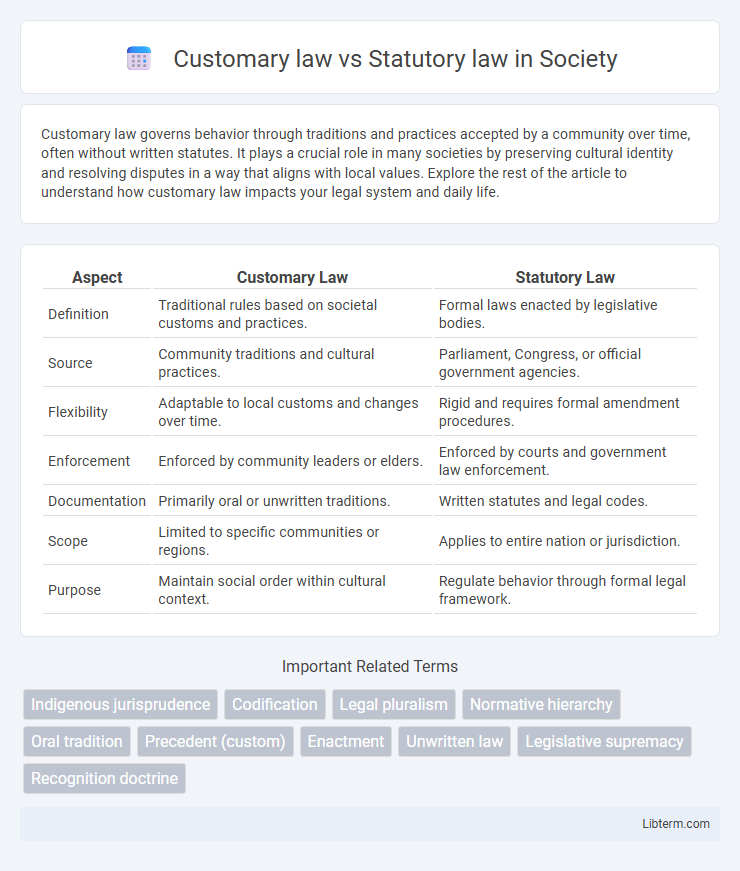Customary law governs behavior through traditions and practices accepted by a community over time, often without written statutes. It plays a crucial role in many societies by preserving cultural identity and resolving disputes in a way that aligns with local values. Explore the rest of the article to understand how customary law impacts your legal system and daily life.
Table of Comparison
| Aspect | Customary Law | Statutory Law |
|---|---|---|
| Definition | Traditional rules based on societal customs and practices. | Formal laws enacted by legislative bodies. |
| Source | Community traditions and cultural practices. | Parliament, Congress, or official government agencies. |
| Flexibility | Adaptable to local customs and changes over time. | Rigid and requires formal amendment procedures. |
| Enforcement | Enforced by community leaders or elders. | Enforced by courts and government law enforcement. |
| Documentation | Primarily oral or unwritten traditions. | Written statutes and legal codes. |
| Scope | Limited to specific communities or regions. | Applies to entire nation or jurisdiction. |
| Purpose | Maintain social order within cultural context. | Regulate behavior through formal legal framework. |
Introduction to Customary and Statutory Law
Customary law consists of traditional norms and practices that have evolved over time within specific communities, governing social behavior and dispute resolution without formal codification. Statutory law is established through formal legislative processes, comprising written laws enacted by governmental bodies to regulate society and enforce legal rights. Understanding the distinction between customary and statutory law is crucial for comprehending how diverse legal systems operate and interact within different jurisdictions.
Defining Customary Law
Customary law consists of traditional norms and practices that are recognized and enforced by local communities, often based on long-standing cultural customs and social agreements. It operates independently from formal legal statutes enacted by governmental bodies, reflecting the values and behaviors accepted by specific groups over time. Customary law plays a crucial role in areas such as family relations, land ownership, and dispute resolution within indigenous and tribal societies.
Understanding Statutory Law
Statutory law consists of written legislation enacted by governmental bodies, providing clear rules and regulations that govern society. It is codified, easily accessible, and specifically designed to address contemporary issues, differing from customary law, which evolves from traditional practices and social customs. Understanding statutory law is crucial for ensuring legal compliance, as it forms the basis for official legal procedures and enforcement.
Historical Development and Origins
Customary law originates from longstanding cultural practices and traditions passed down through generations within specific communities, often predating written legal systems. Statutory law emerged with the formalization of governments and codified legislation, particularly rising during the development of modern nation-states in Europe from the Middle Ages onward. The historical development of statutory law reflects the shift from localized, informal customs to centralized legal frameworks enforced by state authorities.
Key Differences Between Customary and Statutory Law
Customary law is derived from the traditions and practices of indigenous or local communities, while statutory law is created and enacted by legislative bodies. Customary law is often unwritten, flexible, and community-specific, contrasting with the codified, formal, and universally applicable nature of statutory law. Enforcement of customary law relies on social consensus and local authorities, whereas statutory law is upheld by formal judicial systems and government institutions.
Areas of Application and Jurisdiction
Customary law predominantly governs local communities and indigenous populations, addressing cultural practices and social norms within specific regions, often lacking formal codification but holding authority through tradition. Statutory law applies universally within a state's jurisdiction, created by legislative bodies to regulate broader societal issues with formal enactment and documentation. Jurisdictionally, customary law operates primarily at the community or regional level, whereas statutory law holds precedence across national or state jurisdictions, ensuring uniform legal standards.
Strengths and Weaknesses of Customary Law
Customary law offers strengths such as its deep cultural relevance and flexibility to adapt to local traditions, making it highly effective in resolving community disputes and maintaining social harmony. However, its weaknesses include lack of formal documentation, potential inconsistencies, and limited recognition in national legal systems, which can hinder enforceability and create conflicts with statutory law. The informal nature of customary law may also result in biased interpretations and difficulties in addressing modern legal complexities.
Advantages and Limitations of Statutory Law
Statutory law offers clear, written rules enacted by legislative bodies, providing consistency and predictability in legal decisions. It simplifies enforcement and adaptation to societal changes through formal amendments, ensuring laws reflect current values. However, statutory law can lack flexibility, sometimes failing to address unique circumstances or evolving social norms without lengthy legislative processes.
Conflicts and Harmonization Between Both Systems
Conflicts between customary law and statutory law often arise due to differences in cultural norms and formal legal principles, leading to jurisdictional ambiguities and enforcement challenges. Efforts to harmonize both systems focus on integrating customary practices within statutory frameworks, ensuring legal pluralism respects cultural diversity while maintaining rule of law consistency. Successful harmonization requires legal reforms that recognize customary rights, promote dialogue between traditional leaders and state authorities, and create adaptive statutes that accommodate indigenous customs.
The Future of Legal Systems: Integration and Adaptation
The future of legal systems involves integrating customary law with statutory law to enhance cultural relevance and flexibility in governance. Increasing recognition of indigenous practices within statutory frameworks promotes legal pluralism and strengthens community engagement. Advances in technology and globalization further drive adaptation of laws to accommodate diverse societal needs while maintaining legal consistency.
Customary law Infographic

 libterm.com
libterm.com